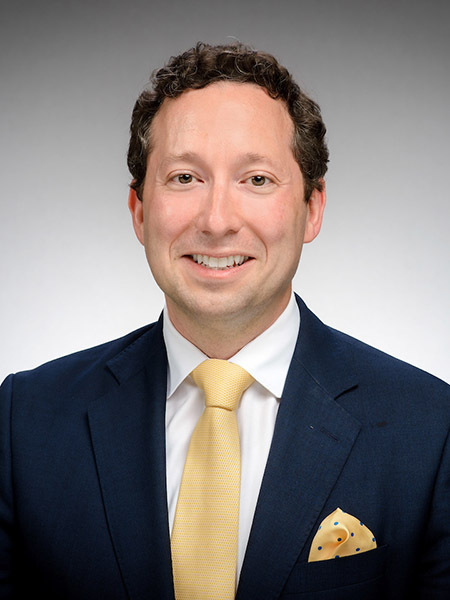Economist Kirk Doran wins UK’s Panmure House Prize honoring interdisciplinary research

Kirk Doran, an associate professor in the Department of Economics at the University of Notre Dame, has won the 2024 Adam Smith Panmure House Prize.
Established in 2021, the prize is named after the forefather of economics and celebrates those who embody his empiricism and long-term interdisciplinary thinking in their research. One of the United Kingdom’s largest academic prizes open to researchers globally, it has been awarded to emerging academic leaders across multiple disciplines, including a business academic, a neurologist and an anthropologist.
“I feel honored and privileged to win the Panmure House Prize. Adam Smith has been an inspiration to me since the first time I began studying social structures and the economy as an undergraduate,” Doran said. “I am particularly inspired by the prize’s aim to explore the relationship between long-term thinking and radical innovation. This is exactly what our current incentive structures both within and outside academia under-incentivize, and that is why Panmure House’s work is so essential here.”
Like Smith, Doran asks fundamental questions that are often hard to find a definitive answer to because they are so overarching. In his research, Doran seeks to identify where and how new knowledge is created in order to ultimately find the cause of long-term per capita economic growth.
Through his subfield of innovation economics, Doran aims to use techniques developed by modern labor economists to answer questions that had been long debated without progress until these techniques were developed. He has applied empirical tactics to measure knowledge generation through bibliometric analysis of interdisciplinary databases — such as papers, patents and medical trials.
His studies find that the development of new knowledge is ultimately based on collaborative relationships in which people inspire and challenge one another.
“We are delighted to see Kirk Doran’s research receive this international recognition,” said John T. McGreevy, the Charles and Jill Fischer Provost. “The Panmure House Prize’s emphasis on long-term, interdisciplinary thinking mirrors the University of Notre Dame’s commitment to scholarly innovation and excellence across the disciplines.”
Doran was one of four finalists from leading global institutions to be considered for the Panmure House Prize. He was supported in pursuing the award by the Office of the Provost and the College of Arts and Letters’ Institute for Scholarship in the Liberal Arts.
With this recognition, Doran plans to continue examining how new knowledge impacts per capita economic growth with a multidisciplinary team. He hopes it will have a policy impact that can benefit productivity.
“I think my research will help to refocus our policy efforts regarding long-term economic growth to the encouragement of deep collaboration among innovative people,” he said. “It is not enough to better educate our workforce or even produce more entrepreneurs, scientists and inventors; such efforts could not possibly produce long-run economic growth unless these individuals enter periods of deep collaboration with each other in the joint production of knowledge.”
Originally published by at al.nd.edu on Oct. 7.
Contact: Tracy DeStazio, associate director of media relations, 574-631-9958 or tdestazi@nd.edu
Latest Colleges & Schools
- The New Yorker’s Jonathan Blitzer to speak at Notre Dame on how immigration became a political crisisThe Klau Institute for Civil and Human Rights is bringing The New Yorker’s Jonathan Blitzer to campus for an in-depth discussion about immigration. His talk will take place at 4 p.m. on Feb. 26 (Wednesday) in the auditorium of the Hesburgh Center for International Studies. The event is free and open to the general public; no tickets are required.
- ND Ethics Week explores business and sustainabilityThe annual Ethics Week series, sponsored by the Mendoza College of Business, brings in experts from diverse perspectives to explore current ethics-related issues.
- PAM-M partners with civil society in baseline report, shedding light on Bangsamoro peace process in the PhilippinesThe Peace Accords Matrix-Mindanao (PAM-M) project, part of the Kroc Institute for International Peace Studies within the Keough School of Global Affairs at the University of Notre Dame, released a civil society baseline report detailing progress and challenges in the Bangsamoro peace process in the Philippines.
- Undersecretary of the Dicastery for Promoting Integral Human Development to deliver Keeley Vatican LectureRev. Msgr. Anthony Onyemuche Ekpo, undersecretary of the Vatican's Dicastery for Promoting Integral Human Development, will deliver the Keeley Vatican Lecture on Monday (Feb. 10) at 5 p.m. at the University of Notre Dame.
- Liam O’Connor selected as 2025 Richard H. Driehaus Prize Laureate at the University of Notre Dame; Philippe Rotthier wins Henry Hope Reed AwardLiam O’Connor has been named the recipient of the 2025 Richard H. Driehaus Prize in honor of his lifelong dedication to and outstanding achievements in creating distinctive private, public and civic projects. In conjunction with the Driehaus Prize, Philippe Rotthier was named the next Henry Hope Reed Award laureate for his lifelong success in elevating new traditional architecture and urbanism to public prominence.
- Aspects of marriage counseling may hold the key to depolarizing, unifying the country, study findsResearch has shown that polarization undermines democracy by driving citizens to prioritize partisan preferences over democratic principles, encourages democratic gridlock and threatens democratic attitudes and norms, such as tolerance for opposition. A recent study from the University of Notre Dame found that “reciprocal group reflection” — an intervention inspired by marriage counseling — helped reduce affective polarization among opposing political parties.













